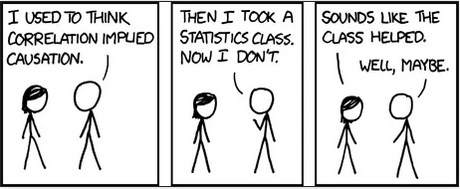Damien demands a bonus as his social media campaign aligns closely with the rise of new registered contacts. However, it is pointed out to him that correlation is not causation. Just because two things correlate does not necessarily mean that one caused the other to perform exactly as it did.
“As the data revolution takes hold, marketers are getting more interested in concepts like correlation in order to interpret consumer buying behavior. However, as Pete Holley, TBG’s Head of Research, explains, correlation and causality is not the same thing. Marketers need to be careful when drawing inferences from Social Data..
Correlation is a measure of the association between two (or more) things. It’s quantified using correlation co-efficients. A correlation of 1 means there’s a perfect straight-line relationship between your two variables, so that if one increases, the other increases by the same amount..
Ultimately, the only way to predict future events is to study how known past events manifested. The grey area between correlation and causation may not matter as much if you can prove that event A is usually followed by event B. You will never be right 100 percent of the time, but then again, what predictions are? The problem with Social Data is also a problem for “big data”: A lack of context can easily skew results. Thoughtful analysis can tell us a lot, but only if context asks the right questions. Brands that do this well will delight consumers, but those that get it wrong will aggravate them. For everyone’s sake, it’s critical to stay on the right side of the Delight-Aggravate continuum” – Pete Holley, TBG’s Head of Research
So now Damien knows how to check the new registered contacts numbers so that they align with the impact of his social media campaigns more directly if wants to claim responsibility.

